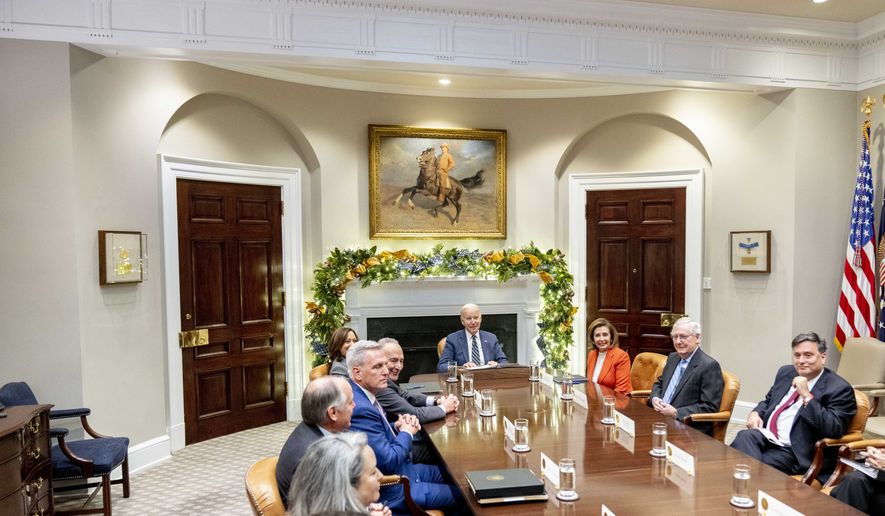A group of bipartisan House and Senate leaders on Tuesday vowed to adopt a tentative agreement between railroad workers and operators to avert a strike that could upend the U.S. economy.
After a White House meeting with President Biden, the Democratic and Republican leaders of both chambers of Congress told reporters that they will work to resolve the strike “as quickly as possible.”
House Speaker Nancy Pelosi, California Democrat, said she plans to move quickly to get legislation to Mr. Biden’s desk.
“I don’t like going against the ability of the unions to strike, but weighing the equities we must avoid a strike,” she said. “Tomorrow morning in the House, we’ll bring up the legislation and send it over to the Senate.”
Senate Majority Leader Charles E. Schumer, New York Democrat, stood alongside Senate Minority Leader Mitch McConnell, Kentucky Republican, and struck a bipartisan chord about averting the strike.
“McConnell and I agreed to try to get it done ASAP,” Mr. Schumer said.
SEE ALSO: Train union down on Biden for pushing Congress to avert strike
House Minority Leader Kevin McCarthy, California Republican, agreed.
The lawmakers’ meeting with the president comes a day after Mr. Biden urged Congress to adopt a tentative agreement between railroad workers and operators to prevent a strike next week.
The five-year deal brokered by the Biden administration includes a 24% pay raise and $5,000 in bonuses.
The pay raises would be retroactive to July 2020, meaning the average rail worker would receive back pay of about $11,000. It also would be the biggest raise railroad workers have received in more than four decades. The railroad industry has said that average rail worker salaries would reach $110,000 annually by the end of the five-year deal in 2025.
However, the lack of sick leave for railroad workers remains a major sticking point and is driving the strike threat. Under the terms of the agreement, railroad workers could take unpaid days off for doctor appointments without penalty under railroad attendance rules.
Despite enthusiasm from Senate leaders to block a strike, it is unclear if the measure has 60 votes in the upper chamber to proceed to a vote. One prominent GOP senator, Marco Rubio of Florida, has signaled opposition to imposing the agreement.
“Just because Congress has the authority to impose a heavy-handed solution does not mean we should. It is wrong for the Biden administration, which has failed to fight for workers, to ask Congress to impose a deal the workers themselves have rejected,” he said in a statement.
When asked if he had the votes, Mr. Schumer told reporters, “We’re working on it.”
Ahead of the meeting, Mr. Biden underscored the importance of resolving the potential rail strike.
“I asked for top leaders in Congress to come in and talk about what we’re going to do between now and Christmas,” the president said. “There’s a lot to do, including resolving the train strike.”
A strike could devastate the U.S. economy by disrupting the supply chain, halting passenger travel and delaying critical materials from reaching water treatment plants during the height of the holiday season.
The momentum has been building behind Congress’ intervention in the railroad union dispute, with few political benefits for either party in allowing a strike at Christmastime.
• Jeff Mordock can be reached at jmordock@washingtontimes.com.




Please read our comment policy before commenting.